 Petzlover
Petzlover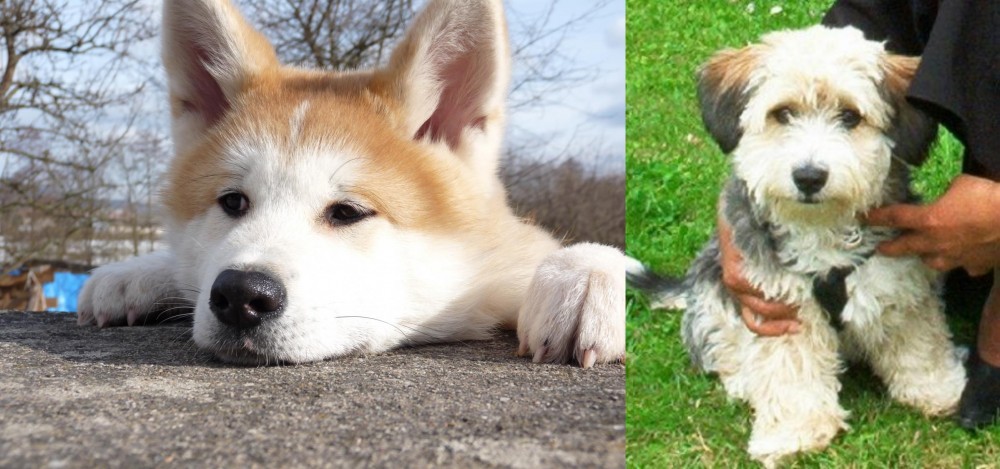 Akita is originated from Japan but Yo-Chon is originated from United States. Akita may grow 40 cm / 16 inches higher than Yo-Chon. Akita may weigh 50 kg / 111 pounds more than Yo-Chon. Both Akita and Yo-Chon has almost same life span. Both Akita and Yo-Chon has almost same litter size. Akita requires Low Maintenance. But Yo-Chon requires Moderate Maintenance
Akita is originated from Japan but Yo-Chon is originated from United States. Akita may grow 40 cm / 16 inches higher than Yo-Chon. Akita may weigh 50 kg / 111 pounds more than Yo-Chon. Both Akita and Yo-Chon has almost same life span. Both Akita and Yo-Chon has almost same litter size. Akita requires Low Maintenance. But Yo-Chon requires Moderate Maintenance
 Akita is a very old breed. The first information originates back in the 1600s. Akita was a royalty guard and a hunting dog. They were popular because of their bravery. Akita even attacked bears. Helen Keller brought the first Akita to America. She admired the breed because of the famous Hachiko, a dog that was known for his loyalty. Today, Akita is a popular dog in the whole world. They are lovely family pets, and if train properly they will be adorable part of any family.
Akita is a very old breed. The first information originates back in the 1600s. Akita was a royalty guard and a hunting dog. They were popular because of their bravery. Akita even attacked bears. Helen Keller brought the first Akita to America. She admired the breed because of the famous Hachiko, a dog that was known for his loyalty. Today, Akita is a popular dog in the whole world. They are lovely family pets, and if train properly they will be adorable part of any family.
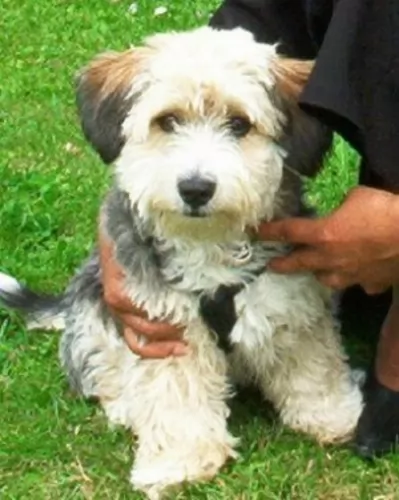 The Yorkie Bichon or Yo-Chon as he is fondly referred to as a designer crossbreed hailing from the United States.
The Yorkie Bichon or Yo-Chon as he is fondly referred to as a designer crossbreed hailing from the United States.
Information isn’t readily available on the origins of this cute little dog, but the dog is believed to be a cross between a Bichon Frise and Yorkshire Terrier.
It is thought that the dog was developed in the United States from about 1998 to 2001. As a hybrid, the Yorkie Bichon isn’t recognized by the American Kennel Club.
 Akita’s average weight is 34-54kg, while their height is 58-66cm. Females are smaller than males.
Lifespan variates from dog to dog but an average lifespan of Akita is 11-15 years. However, if you take care of your dog with a proper diet and regular vet checks they can live longer than average.
Litter Size of Akita is 7-8 puppies, but again, litter size variates because of dog’s genetics.
Other Names for Akita are Akita-Inu and Japanese Akita.
Akita’s average weight is 34-54kg, while their height is 58-66cm. Females are smaller than males.
Lifespan variates from dog to dog but an average lifespan of Akita is 11-15 years. However, if you take care of your dog with a proper diet and regular vet checks they can live longer than average.
Litter Size of Akita is 7-8 puppies, but again, litter size variates because of dog’s genetics.
Other Names for Akita are Akita-Inu and Japanese Akita.
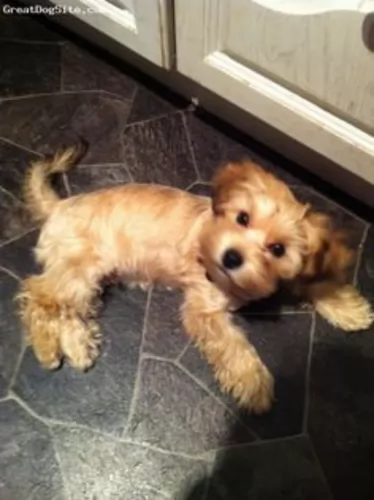 The Yo-Chon stands between 25 and 30cm and weighs in the region of 2 to 4kg. He can be like a teddy-bear this little dog and the coat can be either silky and straight or wavy. It is medium length and some people have the coat professionally trimmed.
The Yo-Chon stands between 25 and 30cm and weighs in the region of 2 to 4kg. He can be like a teddy-bear this little dog and the coat can be either silky and straight or wavy. It is medium length and some people have the coat professionally trimmed.
The low shedding coat comes in a variety of colors – cream, grey, tan, white, black or bi-colored.
Your Yorkie Bichon will no doubt have some habits that come from both parent breeds. Your dog is likely to be independent, social, friendly, social and loving, wanting to spend lots of time with you.
They’re small but they make good watchdogs with their high-pitch bark. Your Yo-Chon is an intelligent little dog too and by having him trained and socialized he is well behaved and pleasant to have around. You can tell him to lie down, sit or stay which is useful when you have visitors.
He gets on well with children, but the puppies particularly are tiny and fragile and they can easily get hurt by untrained and undisciplined children.
 Akita is a very elegant breed. They are very strong and fast, so they had been excellent guards. They sometimes can be stubborn, but they are very loyal to the family. Akita has tendencies to be aggressive to other dogs. Because of their dominant character, they can be especially aggressive towards the same sex. They are the best for one-dog houses. With family, they are very loving and gentle. The best way to train Akita is by positive training with awards. The old-fashioned way like punishing is not recommendable. Constant and firm training is important, so if you are first time owner, it might be a big challenge. If you are first time owner, consider advising with a trainer who knows the breed.
Akita is a very elegant breed. They are very strong and fast, so they had been excellent guards. They sometimes can be stubborn, but they are very loyal to the family. Akita has tendencies to be aggressive to other dogs. Because of their dominant character, they can be especially aggressive towards the same sex. They are the best for one-dog houses. With family, they are very loving and gentle. The best way to train Akita is by positive training with awards. The old-fashioned way like punishing is not recommendable. Constant and firm training is important, so if you are first time owner, it might be a big challenge. If you are first time owner, consider advising with a trainer who knows the breed.
Akita loves to be around family and to be included in family activities. They do not need a lot of activity, but daily routines of one-hour walks or jogging would be ideal for Akita. Visiting parks for dogs is not a good idea because of aggressive attitude towards other animals. If Akita does not have activities they can get bored, and you do not want bored Akita. When bored they start barking, digging, chewing, and sometimes even aggressive. Overall, they are very loving and gentle dogs who love to be around family and enjoy activities. But, they also need proper care and attention which require time and patience.
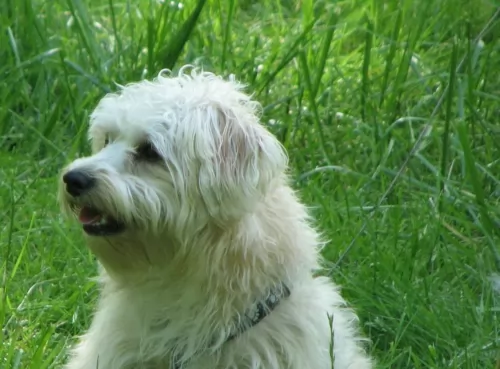 The Yo-Chon is an independent, happy dog who loves nothing more than to be surrounded by all his favorite human beings.
The Yo-Chon is an independent, happy dog who loves nothing more than to be surrounded by all his favorite human beings.
They are loving, loyal and gentle dogs and are good playmates for children who have been taught how to handle them with care and kindness.
He is smart and has an amicable nature and will take kindly to being trained and socialized.
With the Yo-Chon in your life, you can be sure you’re going to benefit from having a splendid family pet and companion.
 Akita is a very healthy breed in general. Nevertheless, almost as every breed, Akita can develop health issues. Hip dysplasia, hypothyroidism, Progressive retinal atrophy are some of the issues Akita might have. Although, if you give your puppy Akita necessary vitamins, with a healthy diet and regular vet checks, it will a very happy and healthy dog. It is also important to know the genetics of your dog, so carefully choosing a puppy is very important.
Akita is a very healthy breed in general. Nevertheless, almost as every breed, Akita can develop health issues. Hip dysplasia, hypothyroidism, Progressive retinal atrophy are some of the issues Akita might have. Although, if you give your puppy Akita necessary vitamins, with a healthy diet and regular vet checks, it will a very happy and healthy dog. It is also important to know the genetics of your dog, so carefully choosing a puppy is very important.
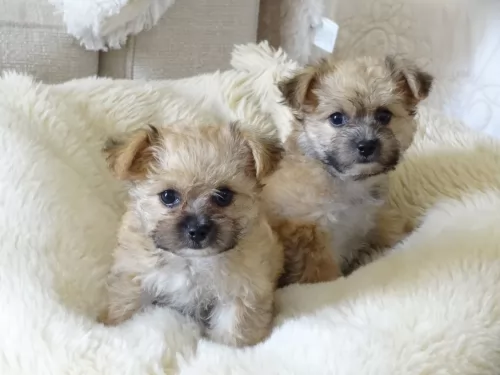 Both the Yorkie and Bichon Frise are dog breeds that are prone to Legg-Calvé-Perthes disease. This is when there is insufficient blood supply to the hind thigh bone, so the dog becomes lame.
Both the Yorkie and Bichon Frise are dog breeds that are prone to Legg-Calvé-Perthes disease. This is when there is insufficient blood supply to the hind thigh bone, so the dog becomes lame.
Surgical correction is necessary. Like small dogs in general, the Yochon might have dental issues. Slipped kneecaps, hypothyroidism and eye problems might affect the Yochon as well.
 It is always important to adjust feeding to size, activity age and built. Dogs who are bigger and have more activity will need more food. For an average Akita 3-5 cups of dry high-quality food, divided into 2 meals will be enough. They also love to eat vegetables like carrots, broccoli, and fruits like apples, oranges, watermelon, etc.
It is always important to adjust feeding to size, activity age and built. Dogs who are bigger and have more activity will need more food. For an average Akita 3-5 cups of dry high-quality food, divided into 2 meals will be enough. They also love to eat vegetables like carrots, broccoli, and fruits like apples, oranges, watermelon, etc.
Akita puppy should have more meals per day plus additional calcium and vitamins. 3-5 meals per day would be an ideal for a puppy. It is a perfect way to develop your puppy into a healthy adult dog.
Grooming Akita is not the worst, but it will require some work. They have a double coat, but they are shedding a lot. Occasional vacuuming will be a new habit that every Akita owner needs. They shed 2-3 times per year, so it is not very bad. When it not shedding, everyday brushing would be a perfect way to groom your Akita.
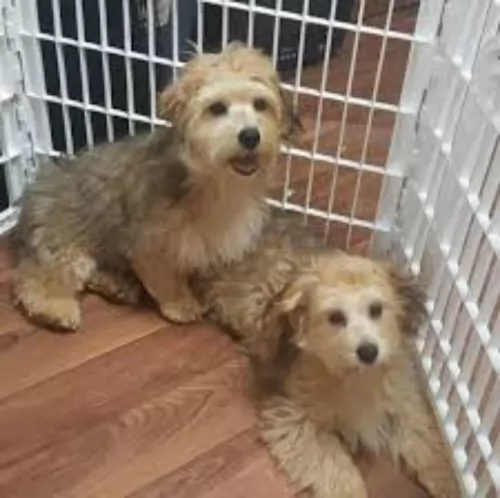 Everybody is busy and they don’t always have time to exercise their pets. As a human being, your health relies heavily on the exercise you get so you and your dog can exercise together.
Everybody is busy and they don’t always have time to exercise their pets. As a human being, your health relies heavily on the exercise you get so you and your dog can exercise together.
These days if you seriously don’t have time and you have money to spare, there are excellent doggy daycare centers where your dog can have fun playtimes with other dogs and people.
Dog exercises will change over time with age but at least try to get used to giving your pet a walk every day as this kind of exercise can extend into old age with both you and your pet.
Swimming, ball games, fetch games and walks or hikes are all great forms of exercise.
Good nutrition ensures your Yorkie Bichon has a good chance to be healthy and energetic. Some of the commercially manufactured dog foods you get are made with bad ingredients and they can make your dog sick.
The good quality ones can be nutritious for your dog and also wonderfully convenient. Always read the packaging labels so you know what your dog’s getting.
Cooked vegetables, boiled chicken and brown rice, nicely chopped up and added to the dry kibble can add variety to your pet’s diet while remaining deliciously nutritious and tasty as well.
Brush your Yo-Chon at least twice a week to keep the hair silky and shiny. Clip your dog’s nails when they get long.
Check inside his ears for signs of redness and the possibility of an infection. Try and look inside his mouth too for bad teeth as this can cause lots of health problems for your pet.
If you don’t have the time to do all these things, there are professional pet groomers who will do all these grooming chores for you.